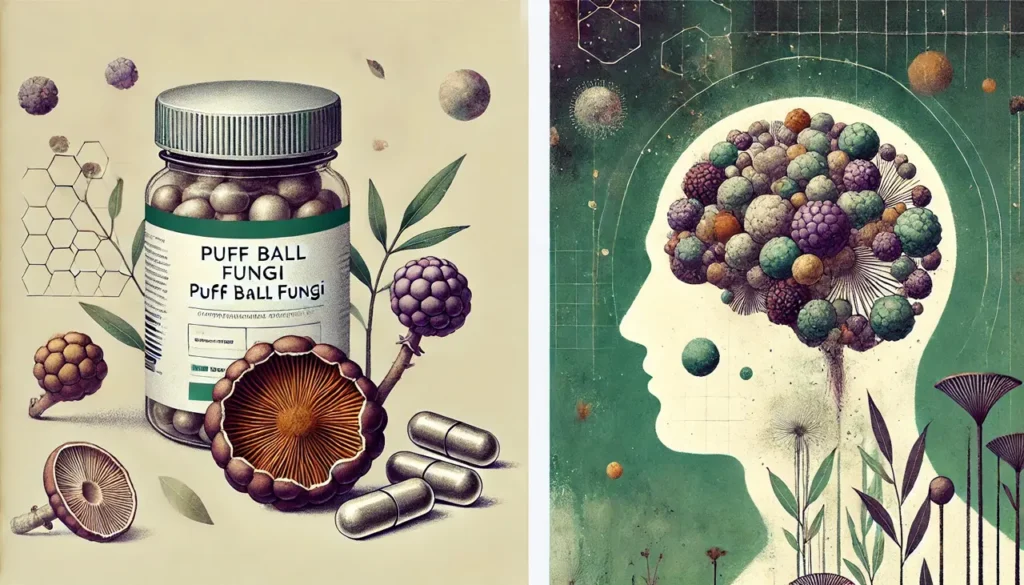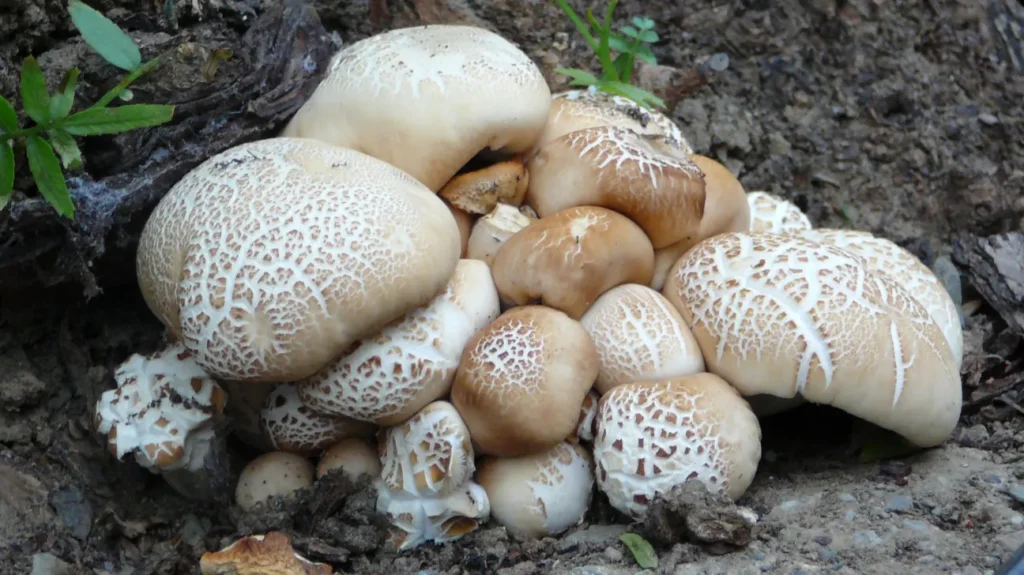Puff Ball, scientifically known as Lycoperdon, is a genus of fungi characterized by its unique appearance and ecological role in nature. Historically, various species within this genus have been used in traditional medicine, particularly in certain cultures in Asia and Europe. Recent interest has surged in the potential nootropic benefits of Puff Ball, especially regarding its impact on cognitive function and overall brain health. This article delves into the chemistry, physiological mechanisms, potential nootropic benefits, dosing guidelines, side effects, drug interactions, and essential safety considerations associated with Puff Ball as a supplement.
You May Also Like:
Tree Tobacco: Benefits, Dosage, Side Effects, Drug Interactions, and Other Important Information
Thymus Extract: Benefits, Dosage, Side Effects, Drug Interactions, and Other Important Information
Sources of Puff Ball
Puff Ball mushrooms are typically found in woodlands, grasslands, and other temperate ecosystems across the globe. They are often distinguished by their round, puff-like shape and can vary in color, ranging from white to brown. Notably, Puff Balls are most commonly harvested during the late summer and fall months when they are mature. They can be consumed in various forms, including fresh, dried, or powdered.
The key species of Puff Ball mushrooms recognized for their medicinal and potential nootropic properties include:
- Common Puffball (Lycoperdon perlatum): This species is commonly found in forests and grasslands, known for its culinary use and traditional medicinal properties.
- Giant Puffball (Calvatia gigantea): This species can reach the size of a soccer ball and is praised for its culinary uses as well as its potential health benefits.
- Earthball (Scleroderma citrinum): Although not a true Puff Ball, this mushroom is often grouped with them and has garnered interest for its medicinal potential.
While the culinary applications of Puff Ball mushrooms are recognized, their nootropic potential remains less explored, warranting further investigation.
Boost Hair Health for Thick, Lustrous, and Resilient Locks—Buy Hair Growth Supplements on Amazon!

Chemistry of Puff Ball
Puff Balls contain various bioactive compounds, including polysaccharides, triterpenoids, and ergosterol, which contribute to their pharmacological properties.
- Polysaccharides: These complex carbohydrates are known for their immunomodulatory and antioxidant properties. Studies have indicated that polysaccharides from mushrooms may enhance immune response and protect against oxidative stress, which is crucial for maintaining brain health.
- Triterpenoids: These compounds exhibit anti-inflammatory and antioxidant effects, potentially benefiting neuroprotection by reducing neuroinflammation, a contributing factor in cognitive decline.
- Ergosterol: This sterol is a key component of fungal cell membranes and serves as a precursor to vitamin D2 when exposed to ultraviolet light. Ergosterol also possesses antioxidant properties, which may help safeguard neurons from oxidative damage.
The intricate chemistry of Puff Ball mushrooms may offer mechanisms through which these compounds exert beneficial effects on cognitive function and overall neurological health.

Physiological Mechanisms of Puff Ball in the Body and Brain
The physiological mechanisms by which Puff Ball may act as a nootropic are primarily linked to its antioxidant, anti-inflammatory, and immunomodulatory properties.
- Antioxidant Activity: Puff Balls contain high levels of antioxidants, which combat oxidative stress—an imbalance between free radicals and antioxidants in the body. Oxidative stress is a known contributor to neurodegenerative disorders and cognitive decline. By neutralizing free radicals, the bioactive compounds in Puff Ball may help protect neurons and maintain cognitive function.
- Anti-Inflammatory Effects: Neuroinflammation is a critical factor in the progression of various neurological conditions. The triterpenoids found in Puff Ball are believed to exert anti-inflammatory effects by inhibiting pro-inflammatory cytokines. This reduction in inflammation could support neuronal health and improve cognitive performance.
- Immunomodulation: The polysaccharides in Puff Ball may enhance immune function, thereby promoting overall brain health. A robust immune response helps to protect the brain from infections and injuries that could lead to cognitive decline.
- Neuroprotective Effects: Through their antioxidant and anti-inflammatory properties, Puff Ball compounds may exert neuroprotective effects that help shield the brain from damage associated with aging and various neurological disorders.
These physiological actions suggest that Puff Ball may hold promise as a nootropic supplement for enhancing cognitive function and protecting brain health.

Nootropic Benefits of Puff Ball
The potential nootropic benefits of Puff Ball are rooted in its chemical composition and physiological mechanisms. While research is still in its early stages, preliminary findings suggest several cognitive advantages associated with Puff Ball supplementation:
- Cognitive Enhancement: The antioxidant properties of Puff Ball may enhance cognitive performance by improving blood flow and oxygenation in the brain. Enhanced energy metabolism in neurons could lead to better focus, memory, and learning abilities.
- Neuroprotection: Puff Ball’s anti-inflammatory and antioxidant effects may provide neuroprotection against age-related cognitive decline and neurodegenerative diseases. By mitigating oxidative stress and inflammation, Puff Ball could help preserve cognitive function over time.
- Mood Improvement: Some compounds in Puff Ball may positively influence mood and emotional well-being. While more research is needed, the potential for Puff Ball to support mood regulation could make it beneficial for individuals experiencing stress or mild anxiety.
- Memory Support: Early studies suggest that the bioactive compounds in Puff Ball may improve memory retention and recall. This could be particularly beneficial for aging individuals seeking to maintain cognitive function.
- Fatigue Reduction: Puff Ball’s energy-boosting properties may help combat mental fatigue, particularly in individuals experiencing high stress levels or cognitive overload. Improved energy metabolism could enhance mental clarity and resilience during demanding tasks.

Dosage and Supplementation Guidelines
Currently, there are no established recommended daily allowances (RDAs) for Puff Ball as a supplement, as its nootropic use is still being researched. However, general guidelines for supplementation can be suggested:
- General Nootropic Dosage: Based on existing research and anecdotal evidence, doses of 500 mg to 2,000 mg of powdered Puff Ball may be considered for cognitive enhancement. However, individual responses can vary, and it is advisable to start with lower doses and gradually increase as needed.
- Supplement Forms: Puff Ball supplements are available in various forms, including powders, capsules, and tinctures. The powdered form can be added to smoothies or meals, while capsules offer convenience for on-the-go supplementation.
- Cycle of Use: To maximize benefits and minimize potential tolerance, it may be beneficial to cycle Puff Ball supplementation—using it for a few weeks, followed by a break. This approach allows the body to maintain sensitivity to its effects.
As with any supplement, consulting a healthcare professional before beginning Puff Ball supplementation is advisable, particularly for individuals with existing health conditions or those taking medications.
Transform Your Sleep Routine with Amazon’s Best Sleeping Supplements—Shop Now Top Picks on Amazon!
Side Effects and Safety
Puff Ball is generally considered safe for most individuals when used appropriately. However, potential side effects and safety considerations should be noted:
- Allergic Reactions: Although rare, some individuals may experience allergic reactions to Puff Ball or other mushrooms. Symptoms may include rash, itching, or gastrointestinal discomfort. Individuals with known mushroom allergies should avoid Puff Ball supplements.
- Digestive Issues: High doses of Puff Ball may lead to gastrointestinal disturbances such as nausea, diarrhea, or bloating. Starting with lower doses can help mitigate these effects.
- Mushroom Sensitivities: Some individuals may have sensitivities to certain mushroom species. Those unfamiliar with Puff Ball should monitor their response closely and consult a healthcare provider if adverse reactions occur.
- Drug Interactions: While Puff Ball has not been widely studied for drug interactions, caution is advised. The immunomodulatory effects of Puff Ball may potentially influence the effectiveness of immunosuppressive medications. Individuals taking such medications should consult their healthcare provider before use.
Risks for Individuals with Certain Health Conditions
Certain health conditions may warrant caution when using Puff Ball supplements:
- Autoimmune Disorders: Given Puff Ball’s immunomodulatory properties, individuals with autoimmune conditions should approach supplementation with caution. The effects on the immune system may exacerbate symptoms or interfere with treatments.
- Pregnancy and Breastfeeding: Limited research exists regarding the safety of Puff Ball during pregnancy and breastfeeding. Pregnant or nursing individuals should consult a healthcare provider before using this supplement.
- Liver Conditions: Individuals with liver disorders may be at risk of impaired metabolism of various compounds found in Puff Ball. Consultation with a healthcare professional is recommended for those with existing liver conditions.

Should You Consider Puff Ball as a Nootropic?
Puff Ball presents a fascinating opportunity as a potential nootropic supplement, with its promising antioxidant, anti-inflammatory, and immunomodulatory properties suggesting benefits for cognitive health. While more research is necessary to fully understand its effects and establish dosage guidelines, early evidence points toward its potential as a supportive supplement for enhancing brain function and protecting against cognitive decline.
As with any supplement, it is crucial to approach Puff Ball use with informed caution and seek guidance from healthcare professionals, especially for individuals with underlying health conditions or those taking medications that may interact with this mushroom. By maintaining an awareness of individual health needs and starting with appropriate dosages, Puff Ball may offer a unique avenue for those looking to bolster their cognitive function and overall brain health.

References:
- From mycelium to spores: A whole circle of biological potency of mosaic puffball. Retrieved from: https://www.sciencedirect.com/science/article/pii/S0254629918320234
- On the anaesthetic properties of the lycoperdon proteus, or common puff-ball. Retrieved from: https://pmc.ncbi.nlm.nih.gov/articles/PMC2449602/
- Fungi in Folk Medicine and Society. Retrieved from: https://www.taylorfrancis.com/chapters/edit/10.1201/9781351072090-20/fungi-folk-medicine-society-david-spoerke
Important Note: The information contained in this article is for general informational purposes only, and should not be construed as health or medical advice, nor is it intended to diagnose, prevent, treat, or cure any disease or health condition. Before embarking on any diet, fitness regimen, or program of nutritional supplementation, it is advisable to consult your healthcare professional in order to determine its safety and probable efficacy in terms of your individual state of health.
Regarding Nutritional Supplements Or Other Non-Prescription Health Products: If any nutritional supplements or other non-prescription health products are mentioned in the foregoing article, any claims or statements made about them have not been evaluated by the U.S. Food and Drug Administration, and such nutritional supplements or other health products are not intended to diagnose, treat, cure, or prevent any disease.


